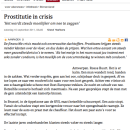Prostitution in crisis
The financial crisis also causes unexpected victims. Prostitutes are getting fewer customers, and causes prices to drop and encourages prostitutes to take more health risks. The crisis is also felt in prostitution. Prostitution is a vulnerable industry where clients often book less in times of financial crisis.
How much money exactly is going on in prostitution, it is difficult to say. Even how many prostitutes there are, it is virtually impossible. We work with impressions and rough estimates. Belgian federal police estimates the number at 23,000. "Between 3,000 and 5,000 in Brussels, about 1850 in Antwerp. But those numbers are probably an underestimate." Doctor Anne Buve of the Institute of Tropical Medicine worked in 2006 on a global estimate of the number of sex workers. "As a rule of thumb: 1 to 2 percent of all women do have sex for money. Especially in cities where there are large income differences, there is a lot of prostitution." How many men go to prostitutes, it is still difficult to calculate. International studies range from 10 percent to 80 percent of all men. The girls rotate working shifts of twelve hours and at least five days a week. Good for a workweek of 60 hours. "The government is complicit in the crisis in prostitution. There are indeed taxes on prostitution which have greatly increased over the past few years."
Only the luxury escorts seem to escape the crisis. Marike runs the Dutch escort agency Society Services and is doing very well. "The financial crisis is particularly felt in the lower segments, not so much with our clients. We do not adjust our rates because of the crisis. We do not compete with prices but with quality."
"What we ask? The average escort can earn 1,000 euros net in one evening. Suppose you have 10 million, but the crisis leaves you with but about 8 million, you don't save on escorts. Rich men might sell their yachts or their third car, but their escorts, they remain."







